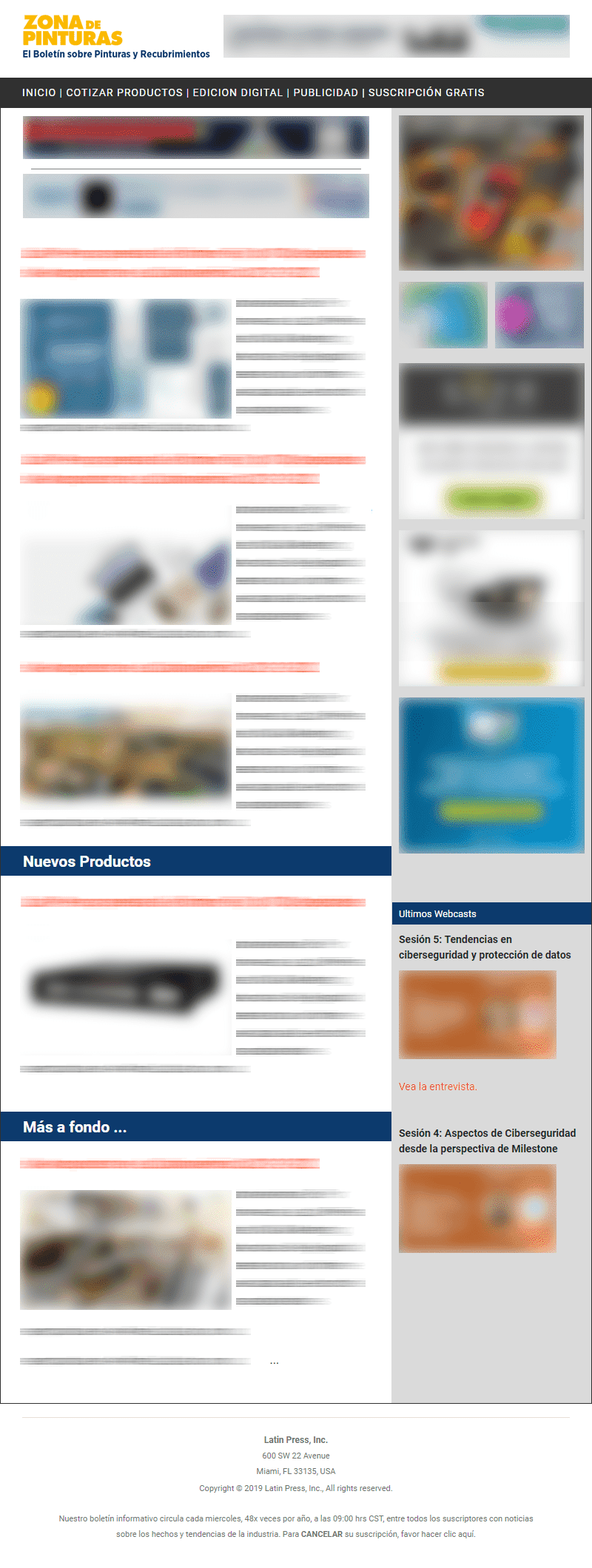Argentina hopes to continue in 2009 with the development of new technologies based on VOC-free paints, which will protect the environment. Although with the crisis manufacturers will have to limit this type of investment, but without neglecting competitiveness.
By Duván Chaverra A.
Faced with all the setbacks that can be experienced in the now thorny economic world, the Argentine market of paints and coatings seems to indicate that it will bet on a solid maintenance within the industry, and at the same time will seek to develop new technologies which allow it to maintain competitiveness.
The companies consulted by INPRA LATINA agree that the sector will remain in expectation of what may happen in the coming months in finance. And it is valid to note that with what has happened so far this year, we can begin to understand the dense atmosphere in which the formulators will have to work, which will surely not be good.
However, this market colonized by American and European multinationals will seek exits to the dark tunnel and at the same time, will continue to develop some plans that since 2008 were in the pipeline to be fulfilled in the present period.
Investments, the birth of new technologies and the promotion of new product lines are objectives that each company aspires to develop despite the era, in order to maintain at least the same line of results as in previous years and thus be able to correct errors on the fly, which can demolish the hard obstacle that since the last quarter of 2008 reduced the fluid mobilization of profits of the sector in the local market.
Thinking about the environment
Some new lines are expected for this year in Argentina. Many products already parade through the market and are perceived as a possible source of relief in the face of bad times.
The use of water-based paints with low VOC content continues to develop and thus being one of the main bets of the gaucho nation. The care of the environment has become a concern and a requirement of distributors and customers in general in their products, to try to increase their sales.
Companies are looking to gradually eliminate solvent-based paints, as previous studies have resulted in the water-based switch not having greater relevance when it comes to modifications to equipment and procedures.
This type of technology is positive for the environment, because during the creation process it allows a separation between solid and liquid waste from the paint, since the former can be recoverable and the latter are biodegradable and do not generate health problems.
In the case of Akzo Nobel, according to Gabriel Marmorato, technical manager of the automotive refinish sector, his company already has some products on the market with these characteristics: "In Argentina we have launched color paints and water-based varnish, and we already have some workshops where the new product has been implemented. It is different technology, for workshops that want to differentiate themselves from others and that seek to protect the environment," said the representative.
For his part, Gabriel Rodríguez, sales manager of Sinteplast, said that now the issue of environmental protection requires more commitment and the development of the paintings is aimed at it. However, he foresees that this change will be slow, especially since in that market there are no regulations for the use of paints with high VOC content.
"In the different lines we try to develop some types of new products. In the part of decorative paints we are moving mainly towards a content with aqueous base or what is known as low VOC, thus eliminating solvent bases, "said Rodríguez, who added that in powder paints they are also working with innovations.
"For industrial paints, especially those made in powder, we are developing their use in the part of gas and pipes, something that we did not do until now and we are also working on some lines for wood."
Another thought about it has Sherwin Williams, because the company estimates that technological growth will not be noticeable due to current and future market conditions, said Nicolás Iadisernia, director of research and development of the Hispanic South American region for the areas of paints and coatings.
"The paint industry has been very active with the new technologies, but we are not going to apply them because we believe that the market will not be in a position to benefit from this."
Iadisernia also added that changes are coming forced by the early disappearance of lead in architectural paintings. "The legislation is already firm and official and the Chamber of the Paint Industry is disseminating among its partners the need to adapt to it. We haven't used lead chromates or other such substances in our paints for many years, but the rest of the market does."
This means that companies will have to adapt to the new processes: "There will be a change in technology because it will go from inorganic pigments made from lead chromates to organic pigments, which in principle have not been shown to have a negative impact on the environment or on people's health," added the executive.
The segment of architectural paintings continues to stand out within the Argentine market, although the movement remains calm and sometimes diminished by the current economic conditions.
For Gabriel Rodríguez, from Sinteplast, in this segment the market has remained by a constant line, but it has also presented reductions in 2009. "The year started off. The reality is that there was a 2008 that was good in the first half and bad in the second, while this time what we expect is an inverse situation, which allows us to finish a balanced period. "
Likewise, Sherwin Williams revealed that his estimated results in 2008 highlight home paints (latex, varnishes and enamels), averaging about US $ 360 million in sales. However, the year that passes for them began unexpectedly.
"We suspected that January was going to be low but not as low as it happened, all because industries are delaying their investments and maintenance. Today we are considering a 0% growth in architecture and even some speak of a -1%,".
For his part, the start of the year in the automotive sector in Akzo Nobel did not surprise and began as they expected: "I think the objectives were met, we knew that the results were going to go down a little but we made a degrowth calculation before that. Now we have to be a little more careful, although in general I see that other sectors are going to be complicated, but I do not consider that to be the case for us," said the technical manager.
The fear of investing
With the global economic crisis the pockets shrink and the corrosive chain expands trapping everything that goes through its path, then production falls and the market is limited, as well as investments, which encourages us to be more cautious when investing.
In Argentina, an increase between 0% and 2% of GDP is expected (according to expert figures), this being of vital importance to have clear ideas about how the paints and coatings industry can behave.
The fear of investing is evident, it is not the best time and before that our sources are clear that their finances have been reduced. No one knows for sure when the situation may change, although many pray that the picture will be different in the second half of this year, when the balance can be balanced.
In Akzo Nobel they will not give up on continuing with their philosophy of working with their distribution within the country and also with their "courses for our customers, workshops with distributors, technical talks. That will continue to be maintained," said Gabriel Marmorato.
On the subject of investments, Marmorato was clear in explaining that they must be justified and profitable, because it is not time to take large risks: "With respect to investment plans will continue to be made where a good justification can be observed, there will be no problem investing. This will be more measured, but everything will depend on the business."
For his part, Gabriel Rodríguez, from Sinteplast, said about news for 2009 that "mainly there will be the launch of some new lines of innovative technology and innovative products for the market, and then we will work closely linked to the channel, supporting the retail channel".
There is optimism
For both architectural and automotive paints, companies expect that during the recession their segments will continue at least to give the results of 2008. The growth expectation for the year in process will be zero.
Daniel Vicente is optimistic and hopes that the home paint market will continue to be seen as a safe investment and trusts in it to continue at the forefront: "Today we believe that 2009 is going to be a difficult year (...) we expect investment in construction to go ahead. just like buying and reselling apartments and that means the paint industry doesn't fall as much as the economy as much as the economy as a whole can."
The sales manager of Sinteplast assures that this year the sector will walk at the same pace as the previous year: "2009 will be, in the first instance, quite quiet and similar to 2008, which had a significant fall in recent months so the results fell significantly compared to 2007".
Ending with the automotive refinish segment, Gabriel Marmorato, expects the consumer to continue taking his damaged car to the workshops, which will allow a sustainability of production in this matter.
"The crisis is going to affect a lot, in Argentina it is a moment of elections but it will not be critical, the problem that our country has is the same as other nations. I think the industry is going to be threatened, but I don't think it will affect the refinish market, because in that sense we think people are going to continue to repair the cars."
























Leave your comment